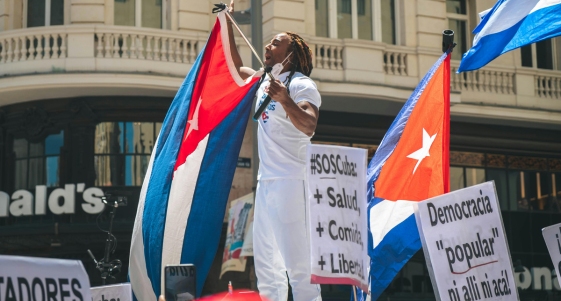People Are Fleeing Socialism, Not Sanctions

In October 2023, a dozen Latin American countries gathered in Mexico to address the ongoing migration crisis in the Western Hemisphere. They concluded that much of the blame should be placed on Washington’s Cuban and Venezuelan sanctions. This sort of thinking dangerously absolves these two authoritarian regimes of their crimes and conceals the underlying problem: socialism.
Socialist policies are what drive Cubans to risk death or imprisonment and sail across the ocean on makeshift rafts to freedom. Venezuela’s self-described “21st century socialism” has caused hyperinflation, famine, and a mass exodus from the once-prosperous Caribbean nation.
Conditions in Cuba and Venezuela remain so dire that many see leaving as the only option. The latest wave of emigration in Cuba has caused the island’s population to shrink by over 4% in the past two years alone. These numbers are much worse in Venezuela where more than 7 million have left. And now, a recent study has found that the number of those seeking to leave Nicaragua, the third far-left regime in the hemisphere, has risen to nearly 50%.
These dismal economic conditions threaten those that stay with poverty and hunger, while political reprisals, religious repression, and a steady rollback of human rights add immediate physical danger. Emigration is not unique to these nations, but the levels seen under these regimes are indicative of the brutal reality of their policies.
Command economies set up by communist and socialist regimes are plagued with inefficiencies that harm the average citizen. Price controls and government “redistribution” have been unequivocally shown to cause shortages, inflation, excessive debt, and other economic maladies which are in turn exacerbated by corrupt officials. Venezuela’s mismanagement of its abundant energy supply has forced the formerly richest country in South America to be reliant on oil imports and aid from Russia and Iran to stay afloat. Likewise, the Cuban economic model of overreach and subsidies has proven to be unsustainable even at providing basic goods and services.
Unfortunately, political repression is a predictable product of communism just as much as economic mismanagement is. Venezuela and Cuba both actively abuse human rights to maintain their single-party systems. The lack of basic rights and the constant threat of totalitarian control are major drivers of the enduring migration crisis which cannot be blamed on sanctions or any other factor beyond the decisions made by the regimes. Ignoring the real causes of the issue may be easier than confronting and challenging communism, but it will not aid the millions of people who have risked and continue to risk their lives to escape it.
Yet, as the Venezuelan and Cuban people suffer from hunger and poverty, these regimes expend precious resources clinging to power and stubbornly adhering to failed socialist and communist policies. Even while in economic crisis, Venezuela shipped oil to Cuba in exchange for Havana’s assistance with controlling the once-independent military and establishing more repressive means of control. This authoritarian partnership mirrors Cuba’s historical relationship with the Soviet Union, where the island exported large amounts of sugar in return for military aid.
By sticking to this anti-democratic alliance, Cuba and Venezuela continue to sink themselves further into economic crisis while blaming U.S. sanctions for their own problems. Economists, however, argue this is simply not the case. Sanctions may restrict their options but these regimes maintain deep connections with China, the second-largest economy in the world, as well as key regional and global partners. Make no mistake, Venezuela and Cuba’s economic woes are the consequence of internal, not external policies.
While Latin Americans continue to flee socialism, many world leaders choose to see U.S. sanctions as reason enough to let Maduro and the Díaz-Canel regime in Cuba off the hook for their oppression. This is dangerous thinking that masks the harm of far-left and command economy regimes, ignores the lessons of history, and excuses the abuses of dictators. The repression and abject poverty that afflict both those who flee and those who stay are tragedies that can be avoided, but doing so means first recognizing these millions of people for what they are: the victims of communism.
Stirling Ewing is an intern at the Victims of Communism Memorial Foundation’s Latin American Studies Program and a graduate student at Arizona State University’s School of Politics and Global Studies.

